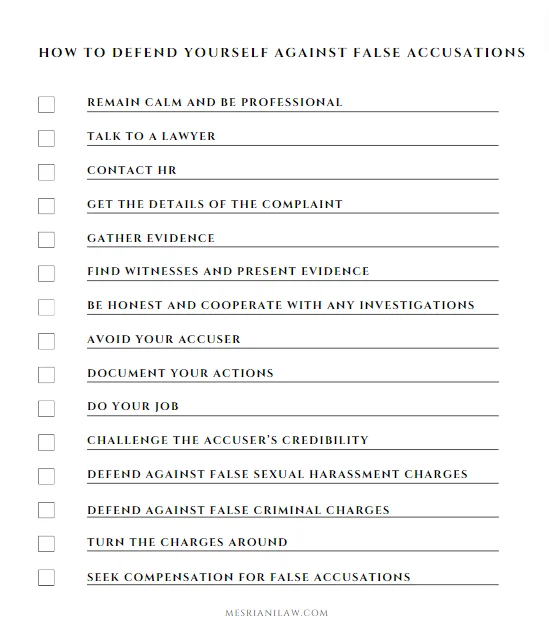False accusations in the workplace can arise from various circumstances. They might stem from simple misunderstandings, honest mistakes, or deliberate malice. Regardless of the intent behind these allegations, the impact on the accused can be severe and can affect their emotional well-being, professional reputation, and financial stability. False accusations can range from claims of sexual harassment and discrimination to wrongful termination and even criminal actions. Understanding how to navigate these situations is crucial for protecting oneself and maintaining a stable work environment.
In many cases, individuals that are falsely accused in the workplace may not know how to respond effectively which can lead to potential legal and professional consequences. The assumption that the truth will naturally prevail can be misleading, as proper defense strategies and legal guidance are often necessary to clear one’s name. Consulting with an experienced attorney can provide valuable insights on how to address false accusations so the accused can defend themselves effectively and seek justice.
If your employment rights have been violated, call us today at (866) 936 7349 to schedule a free consultation
What Should I Do If I Am Falsely Accused of Harassment?
There are steps you can take to protect yourself if someone in your workplace is falsely accusing you of harassment.

Remain Calm and Be Professional
Facing false accusations at work can be emotionally taxing and infuriating. However, maintaining composure and professionalism is crucial in navigating these challenging situations. Reacting with anger or defensiveness can exacerbate the problem which can provide others with reasons to doubt your credibility. Instead, try to remain calm, collected, and respectful throughout the process. Avoid raising your voice, using offensive language, or displaying aggressive body language. This approach not only helps in managing the situation more effectively but also demonstrates your professionalism and commitment to resolving the issue amicably.
In some instances, false accusations may stem from misunderstandings or miscommunications. By staying calm and engaging in a respectful dialogue, you can increase the chances of clarifying the situation and potentially resolving it without escalation. Taking your accuser’s concerns seriously and addressing them in a composed manner can facilitate a more productive conversation. It’s important to remember that navigating false accusations is often a long process that requires patience and careful handling. Reacting professionally and thoughtfully not only helps protect your reputation but also strengthens your position as you work towards clearing your name.
Talk to a Lawyer
When facing false accusations at work, one of the most critical steps you can take is to consult with a lawyer. Knowing your rights and understanding your options is essential and a lawyer can provide the expertise needed to navigate this challenging situation. Depending on the nature of the accusation, you may need to speak with different types of attorneys. For instance, criminal defense attorneys are necessary if accused of a crime, while employment lawyers can help with accusations related to public policy violations, discrimination, retaliation, or defamation of character. A lawyer can help you understand the specifics of your case and develop a strategy to defend yourself effectively.
Consulting with an attorney early in the process can significantly improve your chances of clearing your name. An experienced lawyer will guide you through the legal intricacies, whether you are dealing with criminal charges, workplace disputes, or civil matters. They will help you gather evidence, prepare your defense, and understand the laws relevant to your situation. Additionally, your lawyer can assist in pursuing compensation if the false accusations have caused you significant harm. Delaying legal consultation can result in lost evidence and missed opportunities to strengthen your case. This is why it is important to seek legal advice promptly to ensure you are well-prepared to defend your rights and protect your reputation.
Contact HR
If false accusations have been made against you in the workplace, contacting your human resources (HR) department immediately is crucial. HR is responsible for handling such matters and should launch an internal investigation to assess the claims. Promptly reporting the accusations ensures that the appropriate procedures are followed which will help protect both your rights and the integrity of the workplace environment. An internal investigation can help uncover the truth, address any misunderstandings, and potentially resolve the issue before it escalates.
It is important to note that keeping a detailed record of all interactions with HR is essential. Documenting your conversations including dates, times, and the content discussed can serve as valuable evidence if the situation leads to legal action. These records can demonstrate your proactive efforts to address the false accusations and your cooperation throughout the process. By involving HR early and maintaining thorough documentation, you strengthen your position and help ensure a fair and thorough investigation into the false allegations [1].
Get the Details of the Complaint
When speaking with HR, it is vital to obtain the specific details of the complaint. Demand to know the exact allegations made against you, including the date, time, and location of the supposed incident. This information is crucial for preparing an effective defense. Insist that HR provides these specifics as they should have been recorded when the complaint was initially filed. Do not proceed without these details as you cannot effectively defend yourself against vague or hypothetical accusations. Having clear information allows you to gather relevant evidence and witnesses which will ensure that your defense is based on concrete facts rather than assumptions.
Gather Evidence
Gathering evidence is a critical step in defending yourself against false accusations in the workplace. After consulting with an attorney, begin systematically collecting all relevant documentation that can support your case. This includes emails, text messages, and intra-office chat messages that demonstrate your professional behavior and counter the accusations. Maintaining a detailed log of these communications is essential because they often contain time stamps that can verify your account of events. Additionally, if the accuser has made any social media posts about the situation, take screenshots immediately as these can be deleted later.
It’s also advisable to keep a journal documenting your interactions with the accuser and other relevant parties. Note the dates, times, and nature of these interactions and whether they occur via email, phone, or in person. This journal can serve as a valuable reference if you need to recall details for legal proceedings. Avoid meeting with the accuser alone and if necessary, have a third party present to witness any interactions between you and the accuser. In contentious situations, it may be prudent to have your attorney handle all communications with the accuser to prevent further false allegations. By diligently gathering and organizing evidence, you can build a robust case to prove your innocence and challenge the credibility of the false accusations.
Find Witnesses and Present Evidence
Finding witnesses and presenting evidence are pivotal steps in defending yourself against false accusations. Witnesses who can attest to your whereabouts or behavior at the time of the alleged incident can provide crucial support for your case. For instance, if you were accused of misconduct at a specific time and place, a witness who can confirm you were elsewhere can significantly undermine the accusations. Additionally, your attorney can present physical evidence like video footage, text messages, or emails that corroborate your account and refute the false claims. These pieces of evidence can paint a clear picture of your innocence and discredit the accuser’s allegations.
Your attorney will help identify and prepare witnesses to testify on your behalf and ensure their statements are credible and impactful. An alibi witness who can confirm you were not at the scene of the alleged incident is particularly powerful in creating reasonable doubt. Furthermore, your attorney will strategically present all collected evidence to challenge the accuser’s narrative and highlight inconsistencies in the accuser’s story. By thoroughly gathering witness testimonies and presenting solid evidence, you can build a strong defense that effectively counters the false accusations and protects your reputation.
Be Honest and Cooperate with Any Investigations
When facing false accusations at work, honesty and full cooperation with any investigations are crucial. Clearly and truthfully explain your side of the situation and provide any evidence that supports your defense. This includes any electronic communications which are typically time-stamped and difficult to alter. Having witnesses who can corroborate your account is also beneficial. It is vital to avoid lying, omitting details, or exaggerating the truth because attempting to alter facts to make yourself appear more favorable can backfire and damage your credibility if the truth comes to light.
It’s best to comply fully with your company’s internal investigation procedures. Adhering to these processes not only demonstrates your professionalism but also strengthens your defense. Document all interactions and conversations during the investigation to show your cooperation and transparency. When denying false accusations, do so calmly and unequivocally. Avoid using qualifiers that might weaken your position.
If your employment rights have been violated, call us today at (866) 936 7349 to schedule a free consultation
Avoid Your Accuser
If possible, avoid any interaction with your accuser. If you must speak with them about work-related matters, do so over text or where others can see and hear you. Try not to be alone with them or speak privately on the phone. There should always be unbiased witnesses or documented proof of exactly how the interaction happened. Be calm, polite, and professional in all your necessary interactions. Sometimes, employers will make adjustments to separate parties involved in a workplace conflict if possible, during any investigation. This is especially important if the accusation is regarding any kind of personal misconduct against them such as sexual harassment.
Document Your Actions
After being falsely accused of harassment in the workplace, it is critical to document your actions and interactions. Record any encounters with the accuser, as well as interactions with other colleagues if the accuser is unknown. This documentation should include dates, times, locations, the nature of the interactions, and whether they are past recollections or ongoing events. Keeping detailed records will help demonstrate that your behavior has been professional and that the accusations are unfounded. This proactive approach can provide crucial evidence to support your defense and protect your reputation during any investigations or legal proceedings.
Do Your Job
Do not allow the situation to have a negative impact on your work. Do not become distracted, or isolated, or take excessive time off. Be present and focused to maintain your productivity and professional reputation. A false accusation can distort the way people perceive you and it can be helpful to remind them who you really are as a person and as an employee. This is especially important if the accusations are related to the work itself such as fraud, incompetence, or unreliability.
Challenge the Accuser’s Credibility
After consulting with your attorney, you will develop a strategy tailored to your specific case, whether it involves civil or criminal proceedings. One effective approach is to scrutinize the accuser’s reliability and motives. Does the accuser have a history of dishonesty? Are there personal or professional reasons they might want to harm you? For instance, in a workplace setting, could the accusations be driven by jealousy, competition, or a desire for revenge? Identifying and exposing these ulterior motives can significantly undermine the accuser’s credibility.
Your attorney will play a key role in this process by questioning the accuser under oath if the claim goes to trial. Through cross-examination, your lawyer can highlight inconsistencies in their testimony and reveal any previous instances of dishonesty. By asking pointed questions, your attorney can demonstrate to the judge and jury that the accuser’s statements are unreliable and driven by self-interest rather than truth. This strategy can be instrumental in shifting the focus away from the accusations and towards the accuser’s lack of credibility.
Develop a Strategy for Fighting Against False Sexual Harassment Charges
When accusations of sexual harassment in the workplace arise, companies are required to conduct thorough investigations. Given the severity of sexual harassment allegations and the potential impact on your employment, the first step in developing a defense strategy is to consult with an attorney who can guide you through the process. An attorney will help you cooperate with the investigation while firmly maintaining your innocence and can also intervene if your company retaliates against you in any way. Your defense strategy should include compiling a list of witnesses and colleagues who can support your version of events. Presenting these witnesses to HR can provide a balanced view and challenge the accuser’s claims. By leveraging professional legal support, you can effectively defend yourself against false sexual harassment charges and protect your career and reputation.
Develop a Defense Strategy if You’ve Been Charged with Criminal Action
When facing criminal accusations, it is imperative to have an experienced criminal defense attorney by your side. A qualified attorney can play a pivotal role in seeking witnesses and gathering evidence to refute false allegations. They will meticulously analyze the prosecution’s case to identify any weaknesses or inconsistencies. Challenging the credibility and reliability of the prosecution’s witnesses is crucial and your attorney will employ various strategies to discredit their testimony.
Your defense attorney may also take aggressive steps like threatening to sue the accuser for making false allegations. This approach can sometimes deter the false accuser from proceeding with their claims. An experienced attorney will also ensure that you fully understand the legal process and your rights and prepare you for each stage of the trial if it goes that far. Beyond aiming for a not guilty verdict, your attorney can help you consider future actions like filing a defamation lawsuit against those who falsely accused you.
Turn the Charges Around
In the context of false accusations in the workplace in California, it is crucial to understand that making false statements with the intent to harm someone’s reputation can have serious legal repercussions. California law allows individuals to file defamation lawsuits against those who make false allegations that damage their professional or personal reputation. Defamation includes both libel and slander and proving that the accusations were made maliciously can strengthen your case.
An experienced attorney can help you leverage this aspect of civil law to your advantage. By highlighting the potential legal consequences for making false statements, your attorney can pressure the accuser to reconsider their actions and possibly retract their false claims. This strategy not only helps in clearing your name but also holds the accuser accountable for their deceitful actions. Effectively using the law to address false accusations can shift the focus of any internal investigations and legal proceedings and potentially lead to a favorable outcome for you and preserve your professional reputation.
Seek Compensation for False Accusations
False accusations can cause significant damage to your reputation, career, and personal life. In such cases, seeking monetary compensation through a defamation lawsuit can be a viable option. Defamation involves making false statements that intentionally harm another person’s character. In California, individuals and businesses are protected by defamation laws that allow them to seek compensation for wrongful allegations. To successfully file a defamation lawsuit, you must prove that the false statements made against you were intended to damage your reputation and incite contempt.
If your employment rights have been violated, call us today at (866) 936 7349 to schedule a free consultation
What Not to Do if Falsely Accused of Harassment
There are many different ways to go about handling a false accusation at work depending on the circumstances, but there are a few things that you should never do.
Do Not Lie
Do not fabricate the truth. Do not omit facts. Do not ask anyone else to lie for you. If you are concerned that something might make you look guilty, be honest about it and explain the situation as best you can. Getting caught in a lie can discredit everything you say or do and will make you look guilty even when you’re not.
Do Not Confront Accusers
It is crucial to avoid confronting your accuser directly. Interacting with them can easily be misconstrued as an attempt to intimidate or coerce them, which can backfire and make you appear more guilty. If your job requires you to interact with your accuser, ensure these interactions are professional and take place in the presence of witnesses or in written form. Refrain from discussing the accusations or any related matters as this can be seen as an effort to influence their testimony and may harm your defense.
Seeking legal advice can help you navigate these situations more effectively. An attorney can guide you on how to handle interactions with your accuser and ensure that you take steps that support a positive outcome. By following professional guidance and maintaining appropriate boundaries, you can protect yourself from further complications and strengthen your defense against any false accusations.
Do Not Destroy Any Evidence
When faced with false accusations at work, do not destroy any evidence related to the case. Destroying evidence can severely damage your credibility and make you appear guilty, regardless of your innocence. All relevant documents, emails, text messages, and other communications should be preserved carefully. Maintaining this evidence is crucial for your defense as it can provide vital proof of your actions and help disprove the false allegations. Keeping a thorough record also demonstrates transparency and supports your claim of innocence during any investigations or legal proceedings.

Understanding False Accusations and At Will Employment
California is an at-will employment state [2] which means that an employment relationship can be ended by either party at any time for almost any reason. In fact, no reason has to be given at all. Unfortunately, this means that if someone makes a false accusation against an employee, the employer is generally legally permitted to simply terminate the employee without an investigation. However, if the false accusation is made intentionally with the intent of discriminating against a protected category or as retaliation for engaging in a protected activity, it may be considered wrongful termination.
Navigate The EEOC Claim Process
If someone is terminated as a result of a false accusation, it may be considered wrongful termination if things like discrimination and retaliation [3] are involved. The Equal Employment Opportunity Commission oversees employment laws and matters of wrongful termination. A claim can be filed with them directly and they will investigate the matter. They may find a resolution themselves, or they may issue a “Right to Sue” letter, after which a lawsuit can be filed.
If your employment rights have been violated, call us today at (866) 936 7349 to schedule a free consultation
Slander vs Libel
The law defines false accusations under two general categories [4]:
- Slander – Verbal
- Libel – Written
Slander is a more well-known term colloquially, and it is a common misconception for people to claim they are the victims of slander when it is actually libel.
Libel can sometimes be a little easier to fight since there are word for word statements that can be pointed to and disproven. Also, once the accusation is in writing, the accuser will be less able to change their story. Slander might get more complicated as the accuser has more room to rephrase their statement and alter facts when met with evidence against them. For these same reasons, it can also be easier to hold someone accountable for libel if and when the accusation is proven to be false.
Can I Sue for Being Falsely Accused?
If a false accusation causes real harm, you may be able to take legal action. Sometimes, a false accusation may result in the accused losing their job. If that accusation is shared outside of the company, it might also make it difficult or impossible for the person to find work elsewhere. In these situations, the falsely accused may be able to file a claim for defamation of character.
Can I Sue My Employer for False Accusations?
If an employer makes a false accusation against you and the consequences of that accusation cause damage to your reputation, it might be grounds for a defamation claim. The accusation must be a published false statement that is not privileged and causes harm to the victim. False accusations made by employers can cause damage not only to that job but can also negatively impact your overall reputation and impede your ability to find work elsewhere.
If your employment rights have been violated, call us today at (866) 936 7349 to schedule a free consultation
What Qualifies as Defamation of Character?
In order for an accusation to be considered defamation of character, there is a list of five criteria that all must be met.
A Statement Is Made
The person, in this case your employer or coworker, must have communicated the statement in some way. Ways in which a statement might be made include:
- Verbal comments
- Emails
- Text Messages
- Official Records
- Body Language
- Drawings
- Photographs
The Statement Is Published
They must make the statement to someone else. A private accusation made only to you would not qualify. Ways that this would be met include but are not limited to:
- Directly telling a third party
- Speaking where others can hear
- Sending a message in a group chat
- A publicly accessible document
- A social media post
The Statement Is False
In order for an accusation to be considered defamation, it cannot be true. If someone at your workplace makes negative statements about you that are completely accurate, it does not qualify as defamation, regardless of the outcome. However, if they make an accusation that they genuinely believe to be true, and it turns out to be false, it may not qualify unless they reasonably should have known the truth.
The Statement Caused Harm
There must be some kind of injury or damage caused by the statement. A common reason that someone might sue for defamation involves the employee losing their job, having their professional reputation ruined, and being unable to find work because of the false accusation. False statements that are not harmful are not considered defamation.
The Statement Is Not Privileged
There are some situations where communication is protected and cannot be claimed as defamation such as testimony given under oath. There are also some state laws that consider professional references to be protected statements as well.
Contact Mesriani Law Group if You Have Been Falsely Accused at Work
Having lies told about you in your workplace can be extremely distressing and it can be hard to know how to go about resolving things correctly. An attorney can help you navigate the situation and make the ordeal less stressful. Sometimes, false accusations are a weapon that coworkers and employers might use as a form of harassment or retaliation. If someone is fired because of a false accusation that was made out of discrimination against a protected class or as punishment for engaging in a protected activity, there could possibly be grounds for wrongful termination. If you were wrongfully terminated for false accusations made out of discrimination or retaliation, call Mesriani Law Group today for a free consultation.
Sources
[1] https://www.avvo.com/legal-answers/false-accusations-made-against-me-what-can-i-do–953281.html [2] https://www.dir.ca.gov/dlse/TerminationOfEmployment.pdf [3] https://www.dir.ca.gov/dlse/howtofilelinkcodesections.htm [4] https://www.findlaw.com/injury/torts-and-personal-injuries/defamation-libel-slander.html
Falsely Accused FAQs
Can you get fired for making false accusations?
California is an at will employment state which allows employers to terminate employees for just about any reason that is not motivated by discrimination against a protected class or retaliation for engaging in a protected activity. One of the few exceptions to at will employment is if there is a specific employment contract or collective bargaining agreement in place that states the employee can only be terminated ‘for cause’. This means that they can only be fired if they did something wrong. Making false accusations about coworkers or employers would be a valid cause for firing an employee in most cases.
What to do if you are falsely accused?
If you are facing false accusations at work, it is important to remain calm and be honest. Do not confront your accuser or try to alter the facts. Gather as much evidence as possible to disprove the accusation. Speak to an attorney, human resources, and your union representative if you have one. Get all of the facts of the situation and as much information as possible about your rights and options.
How do you prove you are falsely accused?
If an accusation is false, then it is being made because someone is lying or because there is a misunderstanding. Showing evidence of the truth or explaining the reality of the situation can often clear things up. The best way to go about defending yourself against false accusations at work generally depends on the nature of the accusation.
A coworker says you physically attacked them – You may have security footage that shows otherwise.
A customer says you yelled and cursed at them – A nearby coworker could confirm you did not.
Someone says you were stealing money – You can provide records showing your register is never short.
Your manager says you are not doing your job – You can show them evidence of your productivity or the ticket you sent to IT about your computer not working properly.
Your employee says you called them a “useless piece of trash” – You can explain that you were talking to the copy machine and did not realize they were standing nearby.
A coworker says you were sexually harassing another employee – You might explain that the other employee is your spouse, apologize for making your coworker uncomfortable, and agree to tone down the public affection at work.
What are the psychological effects of false accusations?
Being falsely accused of wrongdoing at work can have a substantial negative impact on your mental health. Not only the shock and hurt that someone would lie about you, but also the stress of trying to prove your innocence. The damage to your reputation can also cause feelings of isolation and depression. The accusation may even carry a risk of criminal charges which can compound the psychological toll of the situation. Even if things are cleared up and everything goes back to normal, there could be lasting anxiety about it happening again. Emotional distress is just one way that false statements can cause real damage.








